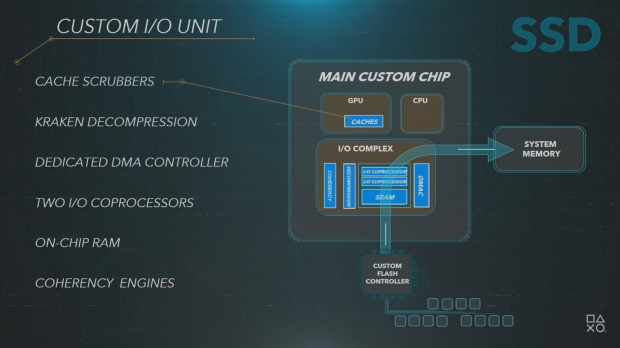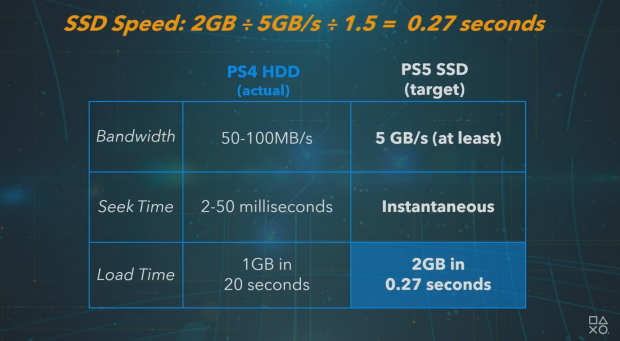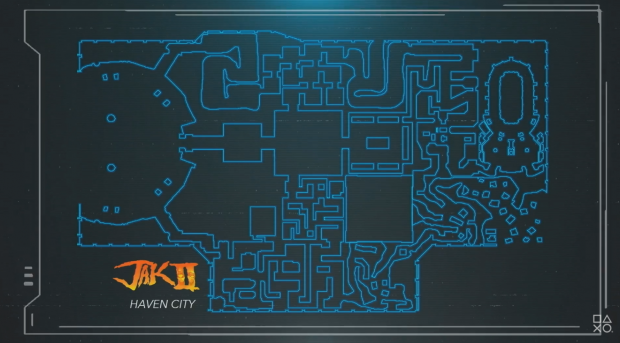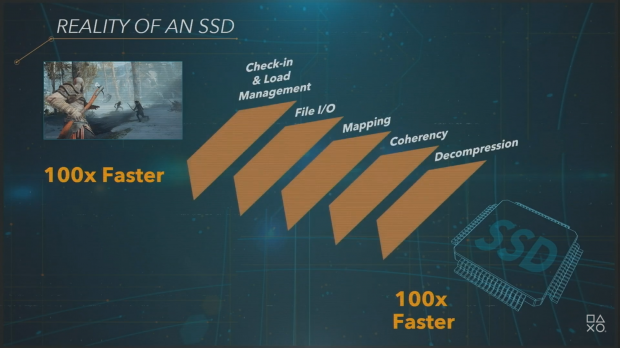The PlayStation 5's internal SSD can fundamentally change how games are played, and more importantly, how they're made. But this won't happen as long as devs are still focusing on current-gen hardware.

Current-gen consoles are going to hold next-gen systems back, at least for a while. The PS5 and Xbox Series X aren't resetting the console generation. The new systems will live alongside the PS4 and Xbox One family for multiple years before next-gen takes over. This is integral for ensuring a smooth shift between gens and carrying current-gen games forward.
During this period, developers and publishers will release games on both generations. Microsoft has said Xbox SX won't have exclusives for years, whereas Sony is expected to launch first-party PS5 exclusives right out of the gate. Still, though, Sony will keep making PS4 games until 2022.
The single biggest advancement in next-gen hardware is SSD storage. Both next-gen systems use their own respective customized PCIe 4.0 x4 NVMe M.2 SSDs that absolutely annihilate the HDDs in current-gen consoles. The PS5's SSD can transfer uncompressed data at up to 5.5GB/sec, which is 100x faster than the PS4's internal drives.
The SSD's speed depends on a customized I/O block on the 7nm AMD SoC alongside potent architectural designs, including an extremely potent compression system. The 825GB SSD has a customized 12-channel flash controller, of which half has accessible for games data, and hardware-based decompression that can channel data like assets, renders, textures and more at 2.7GB/sec, and up to 9GB/sec for compressed data.
Until all games are made for next-gen, the games themselves won't fully tap the potential of SSD tech.
So what do these specs mean for developers? How will they actually affect games? They won't just affect games, but fundamentally revolutionize the development process.
Basically these SSDs represent one thing above all else: Freedom.
Read Also: Understanding the PS5's SSD: A deep dive into next-gen storage tech

Right now making games is an act of war: War against limitations, bottlenecks, and restrictions. A significant part of games development is finding creative ways to circumvent restrictions imposed by lower-end, outdated hardware.
Games are literally developed with these hardware limitations in mind. They have to be, or the games wouldn't work. So developers have to be mindful of all kinds of hardware permutations while they make games, and constantly tailor to the lowest common denominator. In this case, the LCD would be PS4's and Xbox One's mechanical hard drives.
Developers have found creative ways to mask long loading times from these slow drives. There's elevator levels that serve as a joining path between two world states, or a long corridor or cave that sits in between major loading zones. A huge portion of level design is built around how fast assets can be loaded into the SoC and rendered on the screen. The slower the data stream is, the more they have to compromise their original vision and throw in winding pathways and other zones to buffer the new areas.

The SSD also reduces duplication of assets in a game simply because the data is organized so the system can access it once instead of having to replicate it tens--and sometimes even hundreds--of times in every environment. This will shrink overall game install files, which will in turn be further compressed with the PS5's powerful new Kraken-based compression system from RAD Tools.
Remember, HDD's spend 2/3 of their time seeking data, and only 1/3 of the time actually loading data. SSDs don't have any seeking time. Data is just directly shot right across six of the flash controller's 12 lanes for processing.
The SSD revolutionizes games-making by massively accelerating data access speeds. The system can intelligently, efficiently, and quickly access, process, and render data at a rate that's never been seen in consoles before. This is made possible by all components of the complex and powerful customized software and hardware on the system, from the Zen 2 CPU, the Navi GPU, the 16GB GDDR6 RAM, and of course the PCIe 4.0 that channels and stores all the data. Every part has been designed to be synergistic with one another.
So now developers have more freedom because storage limitations have been abolished. SSDs--especially the new custom SSDs--introduce a new era for games development.
But there's only one issue here. Not every developer or publisher will focus exclusively on next-gen. They'll still be making games on PS4 and Xbox One, and that means they'll still be designing them around the lowest common storage denominator (5400RPM drives).

With this rationale in mind, it's first-party developers who make games exclusively for the PlayStation 5 that will see the true benefits of the new SSD technology. That means cross-generation games probably won't hit the potential the new tech has to offer. Sure we'll see upgrades like 120FPS, ray tracing, 4K 60FPS, and quicker load times--dramatically quicker load times--but insofar as the SSD actually defining games development rather than just being a part of it, that should be exclusive to, well, next-gen exclusives.
Bear in mind there's a lot we don't know about the PS5, its SSD, and games development on the system.
Although Mark Cerny revealed a ton of information, we still have no clue what the dev environment is like, or what kinds of flexible tools are baked into the PS5's architecture. We've heard lots of things praising the system's flexibility and ease-of-use, strongly hinting the discrepancy can be significantly mitigated thanks to these toolsets, but it's still hard to shake the idea that current-gen will hold next-gen back for years to come.
We can further glean and infer some tidbits from what developers are saying about the PS5's SSD. Two devs in particular have interesting responses--they're from Sony's first-party Naughty Dog studio, a studio that stands to benefit tremendously from this tech.
Let's hope Sony really is making PlayStation 5 exclusives to launch alongside the system. Otherwise we probably won't get a true taste of what's possible with the PS5 until 2022 or thereabouts when the PS4 is slowly retired.
The console will release in Holiday 2020, and it may cost $499.
Check below for more info on everything we know about the PlayStation 5 so far:
PlayStation 5 specs and details:
- Custom SoC with second-gen Navi GPU, Zen 2 CPU
- 8-Core, 16-thread Zen 2 CPU at 3.5GHz
- Navi 2X GPU with 36 CUs on RDNA 2 at 2.23GHz
- Ultra-fast 825GB SSD with up to 9GB/sec speeds
- Support for 4K 120 Hz TVs
- Ray-tracing enabled
- 8K output support (for gaming)
- Plays PS4 games, BC is on a title-to-title basis
- Separate games that ship on BD-XL Blu-ray discs
- New controller with extensive haptic and tactile feedback
PlayStation 5 Coverage:
- PS5 won't play PS1, PS2 or PS3 discs, 100 PS4 games supported at launch
- Understanding the PS5's SSD: A deep dive into next-gen storage tech
- PlayStation 5 won't use memory cards, supports third-party SSDs
- PlayStation 5 specs: 10TFLOPs Navi RDNA 2 2.23GHz GPU, 3.5GH Zen 2 CPU
- PlayStation 5 SSD speeds hit 9GB/sec with custom 12-channel controller
- PlayStation 5, Xbox Series X ray tracing is easily scalable for devs
- Report: PlayStation 5 Pro and base PlayStation 5 coming in 2020
- 60FPS on next-gen PlayStation 5, Xbox Series X 'is much easier'
- PlayStation 5 specs confirmed by Sony: 10TFLOPs Navi RDNA 2 2.23GHz GPU, 3.5GH Zen 2 CPU
- PlayStation 5 could use Samsung's 980 QVO SSDs
- PlayStation 5 is beating Xbox Series X in dev kit form right now
- Hardly any devs are making next-gen PS5, Xbox Series X games
- Sony working on new horror IP for PlayStation 5
- PlayStation 5 devkit UI possibly leaked
- Leaked PlayStation 5 concepts show weird X-shaped case
- Sony's first-party PS4 exclusives are coming to PC
- PlayStation 5's new DualShock 5 may be usable on PS4
- Sony skips E3 2020, has two major events planned for February
- Next-gen console exclusives will be few and far between through 2021
- PlayStation 5's biggest features have yet to be announced, Sony says
- PS4 has sold over 1 billion games and 106 million consoles
- PlayStation 5 backward compatibility should support every PS4 game
- Sony reveals the PlayStation 5...logo
- New trapezoidal PS5 render is an expensive accident waiting to happen
- A $399 PlayStation 5 will conquer next-gen
- PlayStation 5 to outsell Xbox Series X in 2020, analyst predicts
- PS5 may only enhance PS4 games, legacy PS1, PS2 and PS3 games unlikely
- PlayStation 5 prototype dev kit console gets V-shaped clean
- Sony: The future is coming at CES 2020
- PlayStation 5 GPU: 9.2 TFLOPs with 36 custom Navi compute units
- PlayStation 5 GPU emulates PS4, PS4 Pro with special modes
- PS5, Xbox Series X SSD may use software-defined flash to boost speeds
- PS5's SSD is 'exceptionally powerful,' may beat Xbox Series X speeds
- DualShock 5 renders show new trigger design, USB-C, ergonomic shell
- PlayStation 5 to support 8K gaming, Sony confirms
- New PlayStation 5 renders show off radical different design, again
- Leaked PlayStation 5 ad prices console at $1,000, is totally fake
- Sony seeks a new Head of Strategy for Worldwide Studios
- Leaked PlayStation 5 devkit photos show new DualShock controller
- PS5, Xbox Scarlett SSD may use Optane-like ReRAM to supercharge speeds
- NVIDIA G-Sync monitors to improve PlayStation 5 and Xbox Scarlett
- PlayStation 5: Everything We Know So Far
- PlayStation 5 confirmed to have 8C/16T Zen 2 CPU from AMD
- PS5, Project Scarlett may use Samsung's 6th gen V-NAND NVMe SSDs
- PS5 backward compatibility confirmed, will play PS4 games
- Sony's next-gen PlayStation 5 has 4K 120Hz output support
- PS5, Project Scarlett to hit over 10TFLOPs of power, sources say
- PS4 will be supported into 2022, to live alongside PS5
- Sony: ultra-high-speed SSD is 'the key' to next-gen PS5
- PS5 dev kit rumor: 'ultra-fast RAM', Navi GPU with 13 TFLOPs
- PlayStation 5 rumored to ship with 2TB of super-fast SSD for $499
- Insider: PlayStation 5 dev kit faster than Xbox Scarlett right now
- PS5 cartridges aren't real, patents are for Sony kids toys
- PS5's SSD may benefit PS4 games the most
- PS5 powered by Navi in 2020, AMD making Navi with Sony input
- Cloud-powered PlayStation controller may let you play free game demos
- Gran Turismo 7 is a PlayStation 5 launch title: launches Nov 20, 2020
- PS5 confirmed to support 8K video, ray tracing, all on Navi
- PlayStation 5 rumored to cost $499, launches November 20, 2020
- PlayStation game demos are coming back with Sony's ambitious new plan
- PS5 controller: Built-in mic, USB-C, no lightbar, ergonomic design
- PlayStation 5 concept video shows totally new design
- Sony solves PS5's biggest issue
- Sony: PS5 development going according to plan
- New Viking Assassin's Creed may be next-gen console launch game
- AMD working on 'secret sauce' for next-gen Xbox/PlayStation
- The first real photo of a PlayStation 5 dev kit appears
- Next-gen PS5/Xbox Scarlett open-world game: 'best real-time graphics'
- Sony restructures workforce to prepare for PS5
- PlayStation VR 2: built-in cameras, wireless, ready for PS5
- PS5 games will ship on 100GB Blu-ray BDXL discs
- PS5 and Xbox Scarlett will both handle ray tracing differently
- PlayStation 5 could feature AI-powered 'PlayStation Assist'
- Sony won't abandon singleplayer story-driven games on PS5
- PS5 rumor: GPU is nearly as powerful as RTX 2080, GPU clocked at 2GHz
- PlayStation 5 rumored to be unveiled on February 12, 2020
- Sony to raise PS5 cost thanks to U.S. tariffs


